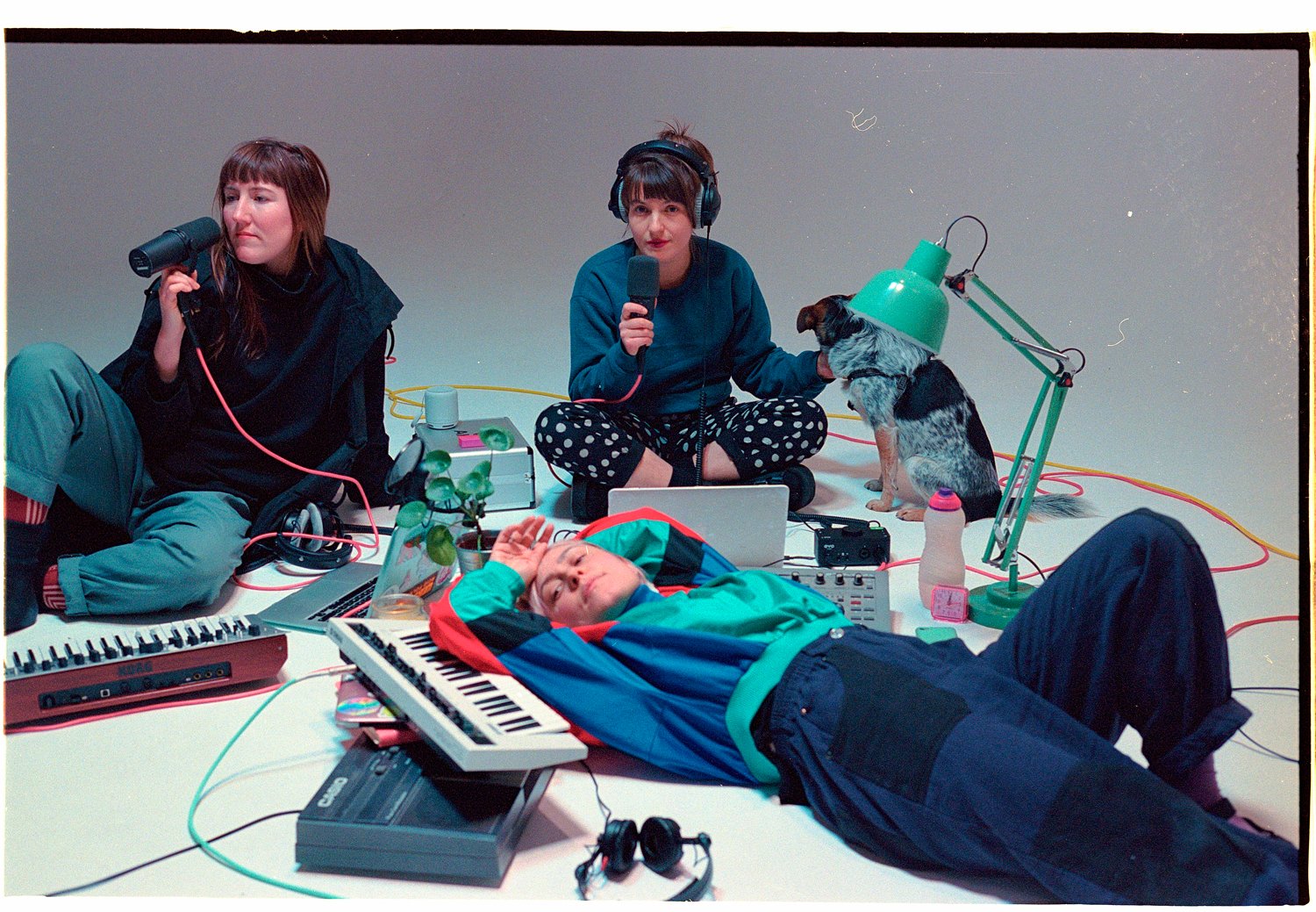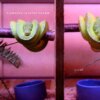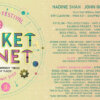Stealing Sheep’s new record Wow Machine is a conceptual computer-based work, exploring and experimenting deeper into the world of electronics than previous, honing the threesome’s sampling, splicing, looping and reversing skills. It serves as a companion piece to an audio installation created as part of the Great Exhibition of the North in Newcastle way back in 2018.
The Sheep’s – Becky Hawley, Emily Lansley, Lucie Mercer – contribution to the exhibition was part of The Hexagon Experiment, put together by Manchester equalities charity Brighter Sound. The trio thought big for the project – because why the hell not – creating a dream cake stage with flavours of Busby Berkeley, three tiers in the shape of hexagons forming a giant cog. They used robotic-style dancers too. ‘We’d been doing some residencies with dancers, creating music specifically for movement. So yeah, we just sort of went with this machine,’ says Becky.
Around the same time, the three women had been working with BBC Radiophonic Workshop, custodians of electronic pioneer Delia Derbyshire’s posthumously discovered tapes. Everything not archived by the BBC was passed it over to the Sheep, and what a curious mix of exciting oddities they were presented with – sci-fi soundscapes and sound effects, machine sounds like a car engine starting up or a laser zapper gun. In 1970, Derbyshire herself noted, ‘people seem to think I’m just working with funny noises, that it isn’t quite serious or something’. Just goes to show, you shouldn’t listen to people – the wonders she conjured up back then have inspired a plethora of artists since, from Aphex Twin, Chemical Brothers, Orbital and more – and fed into what eventually became Wow Machine.
‘Our machine is Delia Derbyshire,’ enthuses Becky. ‘She’s this Wow Machine. She was a machine. She died young but within her lifetime, she just was obsessed with making sounds. And then also we’re the Wow Machine because we’re also continuing this kind of passage of making electronic music as women. We had a resonance with her story as women.’
The black and white photo of Derbyshire we see more often than not is of a quiet, serious faced woman with lacquered 1960s hair fully engrossed in a reel-to-reel tape machine, with a suited and booted man with a clipboard looking on. She is best known for her work on the Dr Who theme tune – although of course her contribution to electronic music is far wider reaching – and this image, as understated as it may be, subtly emphasizes an ‘if you can see it you can be it’ ethos. If women and girls can see successful respected women confidently creating in a traditionally male dominated area – in this case electronic music, boasting technical skills – it has an effect.
‘The Radiophonic Workshop was based in Maida Vale and she used to literally stay up all night making those sounds on her own, on hundreds of metres of tape. She would slice tiny sounds out of the tape and then stick them back together to make what became that the earliest form of techno music, the repetitive beats out of these sounds. A pretty incredible, unusual character. Like you say, that photograph doesn’t fully explain that story,’ says Becky, reeling off a list of inspirational women feeding into Stealing Sheep’s own confidence – Laurie Anderson, Suzanne Ciani, Daphne Oram. ‘These really resonated with us when we were younger. We were like, oh, synthesizers, oh tape machines. Let’s have a play around with those. So, it definitely has had an effect.’
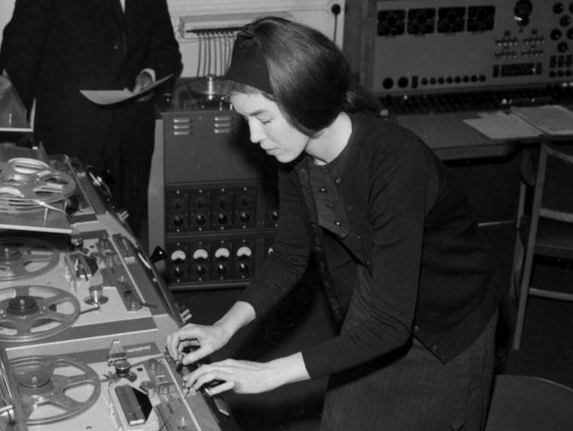
The Anchoress and Jane Weaver are amongst contemporary female artists who have spoken out about personal frustrations at their own production skills and musicianship assumed bit parts in comparison to contributions from male peers. Their own creativity and innovation is they say, commonly reduced. And it’s, as Becky says, as if having any man involved at all is seen as an admittance of failure somehow.
‘People are also often disappointed if there is a man involved because they then assume that the man’s done the main bulk of the work. It’s a weird predicament. Because we like working with men, it’s a different experience. We are already three women, sometimes it’s nice to have a mixture.’
Everyone has a different kind of offering a contribution because of their experience and their cultural bias, she adds.
‘If a man has been involved, what does it actually mean? We like the mixture, but we have been positively discriminating because we know that more women need to be involved and need more power.’
There’s a well worn trope that women create to express emotions and men create for artistic reasons and expression. What does she think of that?
‘It is a trope and in some ways we fall into that trope because we’re emotional, but I feel to be feminist and be emotional is almost like a more a daring act. Because you have to be, “yeah, I am sensitive and I am emotional and I want the music to be feminine sometimes” – our interpretation of feminine.’ It’s a common thought and somewhat of a cliché, for feminism in music being abrasive and angry – you don’t have to be The Slits for example to express yourself in an authentically feminist manner. ‘But when we have a gentle piece of music, I see a lot of bravery in it. Because it flies in the face of the trope in some sense. It’s not just punk music in feminsim is it?’
Wow Machine the record was created remotely, each Sheep in their individual home taking roughly 15 minutes or so of the album and working independently.
‘….so it sounds quite eclectic!’ Becky laughs.
It’s been on quite a journey she admits, created as it was during lockdown. She imagined the tracks floating around on hard drives wondering if they would remain there, unreleased and alone. The band unashamedly summoned the spirit of Delia Derbyshire for it, and mirrored the methods their shero used – albeit with 21st century technology. Because let’s face it, this is what Derbyshire herself would do in contemporary times, had she been around today. Made full use of what was on offer.
‘What she does with tape, cutting up and using these repetitions is what we were mirroring in our software. It was a lot easier for us because obviously we have this shortcut, the software is emulating that process.’ Where Derbyshire had tape in one hand and a razor blade in the other, they had software. ‘So I feel like the music that we made is like the modern day version of what she would have made. We definitely tried to stay true to her and did a lot of research into her methods and the effects that she was making and how we could emulate them. Within the software, you would get a plugin of like, a cassette delay, and then you customize that delay in the way that she would customize it. You fiddle with it within the software, if that makes sense.’
Can you imagine how long it would have taken if you’d done manually?
‘I know, can you imagine? And it took us a long time anyway!’
Becky describes the album as a ‘de-roading‘ in that it isn’t a continuation of their first three studio releases. But its inclusion in Stealing Sheep’s discography builds a realistic archive of the band’s trajectory and history. ‘It might be confusing for the audience because they go “oh, this band that just released a krautrock album and now electric but we’re like, well, no, we were fully electric back then. But now we’re playing guitars!” It does muddle maybe with outside perception, it’s not a steady curve of instrumentation and arrangement and process. Maybe you know, interviews like this will help people get the full story.’
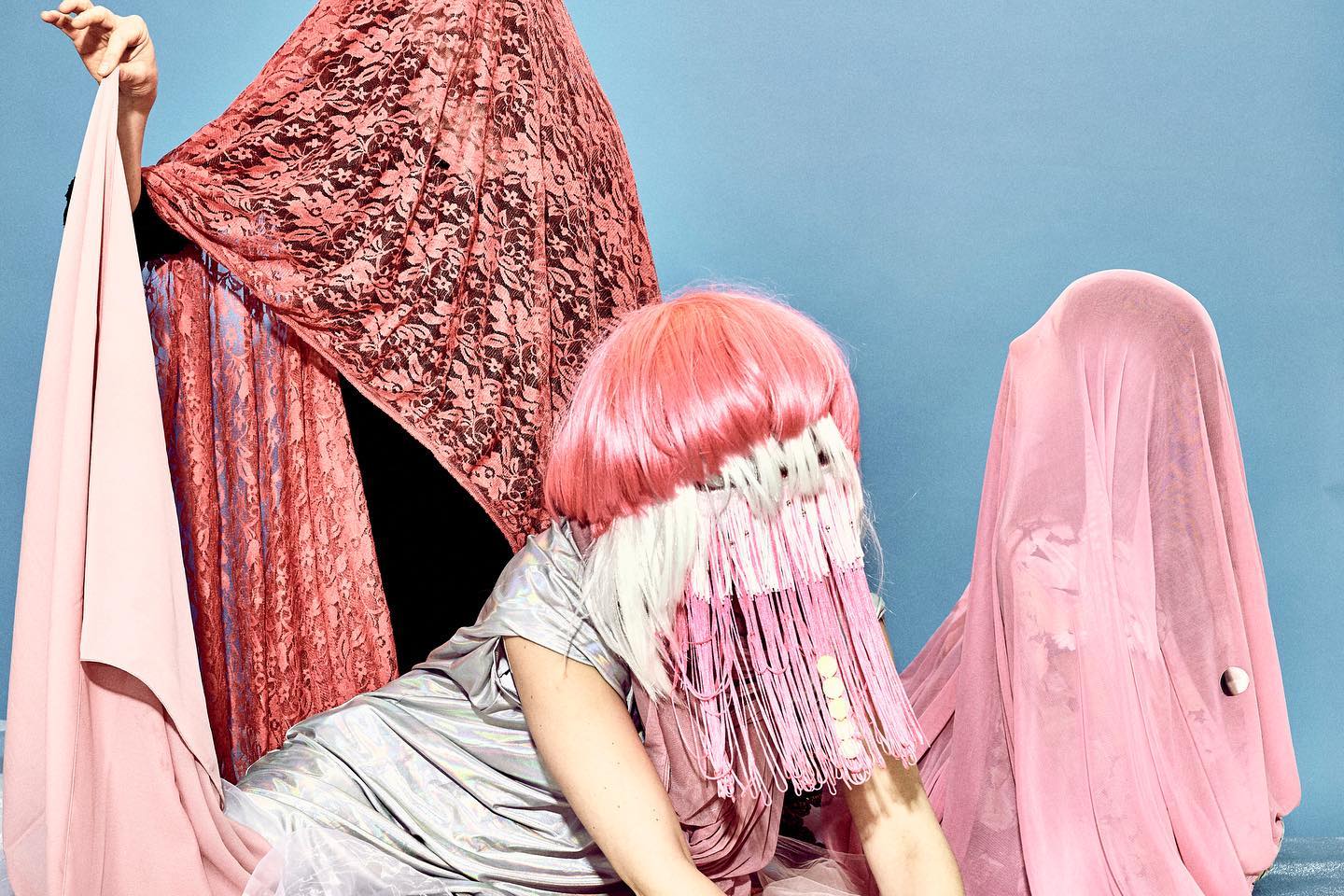
Wow Machine is still unmistakably Stealing Sheep though. The fifteen-minute long ‘Don’t Think, Just Do‘ a contribution by Lucie, carries an empowering message.
‘Her art teacher used to say that to her. So I imagine it has I mean, it has lots of meanings in some senses, but I think the art teacher was sort of trying to say just yeah just let it happen.’
One can’t help but picture the spirit of Delia Derbyshire being summoned to create the track ‘Disco Italo‘. It’s proper science fiction, disco trip.
‘In that era, when Italo disco first came about in the late 70s that’s when people first got vocoders and more synthesizers. So what was hip-hop and disco melded, then became this italo disco but like with real bass, guitars and funk, so it’s sort of like, “Oh, here’s where we’ve ended up by doing this process of working on stuff in this way that this woman did in the 60s and then also merging it with our disco pop”.’
Stealing Sheep are described in so many ways – experimental pop trio, electronic modernists, electropop trio, alt pop trio all thrown at them. How do they describe themselves, with Wow Machine thrown in the mix?
‘Our constant identity crisis of what we are is the beauty and the beast of the project,’ she laughs. ‘I think it kind of works against us. After the years that we’ve been doing it and the changes that we’ve had, I think it’s a form of psychedelic music. It takes on not the stereotypes that you put with psychedelia, but what we often intend is a mind bending experience that’s immersive for the listener when we’re doing it live, enhanced often by these theatrical elements. But also the music itself, we put a lot of sound effects in, things that transport the listener. It’s visual music in some senses. I think it’s psychedelic, even when it’s not your krauty sort of psychedelic. It is a psychedelic experience. That’s what we kind of tend to imagine when we’re trying to think about the listener.’
Stealing Sheep supported OMD on a UK tour last year and Becky sees playing in historic theatres with the legendary synth pop pioneers, the perfect post-pandemic re-introduction into the real world. Last August the FestEVOL all dayer at Liverpool’s Invisible Wind Factory was a home from home. Listening to all three Stealing Sheep early one morn describing their studio at the IWF to 6 Music’s Chris Hawkins, they painted a verbal picture of rooms full of creativity and colour, from ‘haberdashery explosion’ and playground of curious instruments and oddities. They’ve kept all sort of stuff in there from their early days. ‘So you just go down memory lane and find all of the all of the mad things like all of our memorabilia from Japan or like our old club shows or at the Kazimier. That was like mythical creatures and costumes that are on that mythical spectrum. Then there was like the pagan pop era with massive 70s dresses…’
The thing is about Stealing Sheep, they’re always up to somethin’. Whether Suffragette-themed processions or dance formations, theatrical displays, soundtracks, or organising women-friendly events. They’re back onstage at IWF in September for the one-day Sheeptopia Festival. During lockdown, they carried out the Infinite Visions music industry ecology research and development projects, collaborating with other women artists to discuss how they were going to reshape the music industry from the inside out. What’s the Sheep collective vision for utopia in the music industry? they asked themselves. Sheeptopia is the first step to finding out.
‘And also the music scene in Liverpool which we were so integral to and so engrossed in, it just seems to, like dissipated. And maybe we’re just out of touch with it. Maybe we’re also not fueling it anymore. We needed to do something that had real meaning behind it.’
Although the story and struggles of Delia Derbyshire and female trailblazers from years past might be different from those making their way in the world now, there are definite similarities. Even now women experience stumbling blocks and glass ceilings cracked but not yet smashed through. In Derbyshire’s own words, ‘I did rebel against a lot of…ah hah. Yes, I did. I did all sorts of things I was told I couldn’t do and yes, I think I’ve always been a very independent thinker.. I think that’s a very healthy thing to do, for anyone.’
Wise advice indeed. What challenges have Becky, and Emily and Lucie faced and overcome as artists, especially when you were starting out, that you could apply to the Sheeptopia vision?
‘Part of that is getting industry attention and that would be bringing the industry to Liverpool. We’ve got contacts and bringing A&R people to the show in a kind of organic way and not in an industry festival kind of way. Just friends that might want to put their put an ear to the ground as to what’s going on. London’s where it’s at with the music scene. That’s where label people generally are and so we needed to make those connections and that’s how we started. So we’re continuing it and giving it back and asked, well, who are the new voices in Liverpool and let’s bring them together!’
In the band’s early days and since, they experienced operating in male-dominated environments, which Becky freely admits was intimidating and dropped confidence levels. Women producers, mixers, sound engineers, lighting techs, are underseen and the Sheep’s aim is to try and shine a light on them. ‘We hope that other people go “oh, there’s women doing that job. Let’s do that. I could do that job.” We’re paying attention to the environment, the space for people who are working on it, sowing new seeds of what we want the experience to be for new artists. And that applies to the audience and who we’re trying to cater for. How do we think about getting more women at gigs and feeling safe at gigs? Because women are put off by going to gigs, it’s generally just a load of blokes. And so we need to do a lot of work on how we make people feel comfortable at shows.’
It’s difficult for women to go on their own sometimes, not because all gigs are dangerous for women but perhaps of preconceptions we ourselves have. A lot of women find the thought of heading off to a show solo, terrifying.
‘I think so. And that’s why we’ve got to kind of adjust the environment to help with that. And it’s going to be maybe a slow process. It might not be “Oh, right, we’ve nailed it” after one show. It might be a bit of an evolution. But we’re, why not? Why not? Why not? Us? Why not? Why don’t we?’
Wow Machine by Stealing Sheep is out now on Brighter Sounds’ Both Sides label.
Live dates:
21 July Bluedot
10 Sept Sheeptopia at Invisible Wind Factory Liverpool

